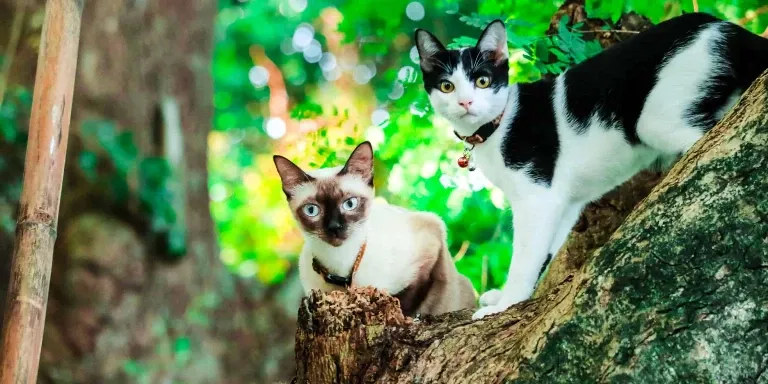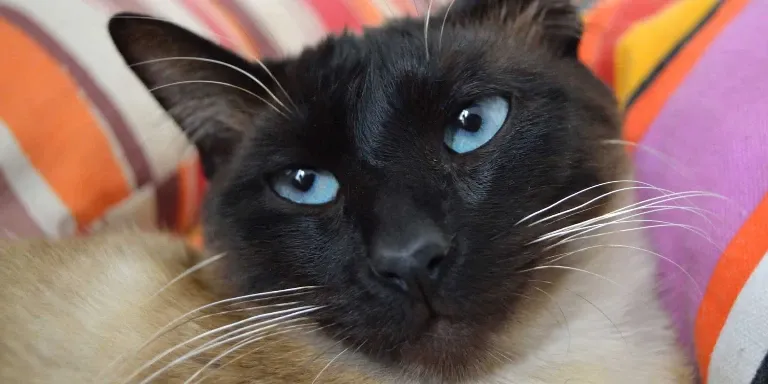The Best Fluffy Pancakes recipe you will fall in love with. Full of tips and tricks to help you make the best pancakes.

Do you own a Siamese cat and feel like they are constantly giving you attitude? You’re not alone. Siamese cats are notorious for their ‘mean’behavior, but it’s important to understand that there are reasons behind it.
Siamese cats are not necessarily mean, but they are known for being vocal and demanding. This behavior is often due to their intelligence and their desire for attention and interaction with their owners. Proper socialization and training can help to prevent any negative behavior in Siamese cats.
In this article, we’ll explore the nature of the Siamese cat breed, the role of nature vs. nurture, and the importance of socialization and stimulation in addressing behavioral issues.
Siamese cats are known for their vocal nature and demanding personalities, which can be interpreted as ‘mean,’but it’s important to remember that this behavior is rooted in their genetics. Siamese cats are an ancient breed originating from Thailand, where they were highly valued and even considered sacred. They were bred for their intelligence, loyalty, and vocal nature, which helped them communicate with their human companions.
However, this also means that they have a strong sense of self and can be stubborn and assertive when they want something. Understanding this aspect of their nature can help you better communicate with your Siamese cat and address any behavioral issues.
Understanding the Siamese Cat Breed
You might be surprised to learn that Siamese cats aren’t inherently mean, but rather have a strong personality and require plenty of attention and socialization to thrive.
The Siamese cat is known for its intelligence, curiosity, and vocal nature. They’re an ancient breed, originating in Thailand, where they were highly valued as companions to royalty.
Siamese cats have a unique temperament that sets them apart from other breeds. They’re highly social and demand attention from their owners. They’re also known for being very vocal and will often communicate with their owners through meows and other vocalizations.
If they’re not given enough attention and socialization, they can become bored and destructive, which can lead to behavioral issues.
It’s important to note that not all Siamese cats have the same personality. Like humans, each cat is an individual with a unique personality and temperament. Some Siamese cats may be more reserved and independent, while others may be more outgoing and social.
With proper socialization and attention, however, most Siamese cats can thrive and become loving and loyal companions.
The Role of Nature vs. Nurture
When it comes to explaining the behavior of Siamese cats, it’s important to consider the role of nature versus nurture. Genetics or environment? Which one plays a bigger role in shaping a cat’s personality?
While genetics certainly play a part, early life experiences can also have a significant impact on a cat’s temperament. Siamese cats are known for being demanding and temperamental, but this doesn’t necessarily mean they’re mean. In fact, Siamese cats are often quite affectionate and loyal to their owners. However, they can also be prone to anxiety and stress, which can lead to aggressive behavior.
This is where the role of early life experiences comes in. If a Siamese cat is raised in a stressful or chaotic environment, they may develop negative behaviors as a coping mechanism. On the other hand, if a Siamese cat is raised in a calm and nurturing environment, they may become more playful and relaxed. Therefore, it’s important to provide a positive and stable environment for Siamese cats in order to promote positive behaviors and prevent aggression.
While genetics certainly play a role in shaping a Siamese cat’s personality, early life experiences can have a significant impact as well. By providing a positive and stable environment, Siamese cat owners can help promote positive behaviors and prevent aggression. So, if you’re considering adopting a Siamese cat, be sure to provide plenty of love, attention, and a peaceful living space for your furry friend.
The Importance of Socialization
The socialization of a cat impacts their behavior and personality, showing the importance of early interactions with humans and other animals. Siamese cats are no exception to this rule. Early intervention and socialization techniques can help mitigate any negative behaviors that may be associated with the breed.
Siamese cats are known for being independent and sometimes aloof. However, this doesn’t mean they can’t be loving and affectionate pets. Socialization can help Siamese cats develop positive relationships with humans and other animals. It’s important to start socializing your Siamese cat as early as possible to ensure they grow up to be well-adjusted pets.
Socialization techniques vary, but some examples include exposing your cat to different environments, people, and animals. This will help them become more comfortable with new experiences and less likely to exhibit aggressive or hostile behavior. Additionally, providing positive reinforcement when your cat exhibits good behavior can encourage them to continue those behaviors in the future.
With the right socialization techniques, a Siamese cat can become a loving and affectionate companion for years to come.
Providing Adequate Stimulation
To ensure your furry friend stays happy and healthy, it’s important they receive adequate mental and physical stimulation every day. This is especially true for Siamese cats, who can be mean when bored or understimulated.
Interactive toys are great for keeping Siamese cats engaged and stimulated. Puzzle feeders and laser pointers are just a couple of options that can provide hours of entertainment for your feline friend.
Playtime is crucial for Siamese cats since they’re an active breed that needs plenty of exercise. Regular playtime can reduce their stress levels and prevent destructive behavior. It’s important to remember that playtime should be a positive experience for both you and your cat. It’s not just about physical exercise, but also mental stimulation and bonding between you and your furry friend.
Incorporating interactive toys and playtime into your Siamese cat’s daily routine can prevent boredom and keep them from becoming mean or aggressive. Find toys your cat enjoys and switch them up regularly to avoid boredom. Remember to always supervise your cat during playtime and provide a safe environment for them to play.
With the right stimulation and plenty of love and attention, your Siamese cat can be a happy and loving companion for years to come.
Addressing Behavioral Issues
If your furry friend is acting out, try addressing their behavioral issues with positive reinforcement training and plenty of patience and love. Siamese cats can be particularly temperamental, but with the right approach, you can help them become more well-behaved.
Start by identifying their triggers. Does your cat become aggressive when they’re hungry or when they’re overstimulated? Understanding what sets them off can help you anticipate their behavior and take steps to prevent negative reactions.
Next, set clear boundaries for your cat. This means establishing rules for their behavior and consistently reinforcing them. For example, if your cat bites or scratches, make it clear that this behavior is not acceptable by redirecting their attention to a toy or a scratching post.
It’s important to reward good behavior as well. When your cat behaves well, offer them treats, praise, or playtime to reinforce positive actions.
Be patient and loving with your cat. Behavioral issues can take time to resolve, and it’s important to approach training with a positive attitude. Remember that your cat is not being mean on purpose – they may simply be reacting to stress or anxiety.
By providing a safe, loving environment and consistent training, you can help your Siamese cat become a happier, more well-behaved companion.
Seeking Professional Help
If you’re struggling with your Siamese cat’s behavior, it may be time to seek professional help. Consulting with your vet is a good first step as they can rule out any underlying medical issues that may be contributing to your cat’s behavior.
You may also consider working with a certified animal behaviorist. They can help you develop a personalized plan to address your cat’s specific behavioral issues.
Remember, seeking professional help can make a big difference in your cat’s behavior and overall well-being. Don’t hesitate to reach out for assistance.
Consulting with a Veterinarian
Consult with a vet and gain insight into why your Siamese cat may be exhibiting aggressive behavior, like a detective piecing together clues to solve a mystery.
Many people assume that their cat’s behavior is solely attributed to their breed, but there are often underlying medical or environmental factors that contribute to their behavior. A veterinarian can rule out any medical issues that may be causing discomfort or pain, and provide recommendations for behavior modification techniques or medication, if necessary.
It’s important to note that there are common misconceptions about cats and their behavior. Many people believe that cats are solitary animals, but in reality, they are social creatures that require attention and affection. Additionally, some may believe that cats are naturally aloof and independent, but this is not always the case.
By consulting with a veterinarian, you can gain a better understanding of your Siamese cat’s behavior and needs and ultimately provide them with the proper care and attention they deserve.
Working with a Certified Animal Behaviorist
Working with a certified animal behaviorist can be incredibly beneficial when it comes to understanding your siamese cat’s behavior and taking the necessary steps to improve their well-being. These professionals are trained to identify triggers that may be causing your cat to act aggressively or exhibit other negative behaviors.
By working closely with an animal behaviorist, you can develop a deeper understanding of your furry friend’s personality and learn how to set boundaries that will help them feel safe and secure.
One of the key benefits of working with an animal behaviorist is that they can help you develop personalized training plans that are tailored to your siamese cat’s specific needs. Whether your cat is struggling with aggression, anxiety, or other behavioral issues, a behaviorist can provide you with the tools and techniques you need to address these issues head-on.
By setting clear goals and working with your cat consistently, you can help them overcome their challenges and develop positive behaviors that will enhance their overall well-being.
Positive Reinforcement Training Techniques
You’ll be amazed at how quickly your Siamese cat will transform into a loving companion with positive reinforcement training techniques – it’s like magic! Positive reinforcement is a powerful tool that can change your cat’s behavior for the better. This training method rewards your cat for good behavior, which encourages them to repeat it.
Here are some positive reinforcement techniques that you can use:
- Treats: Reward your cat with their favorite treat when they display good behavior. This could be anything from using the litter box to playing nicely with other pets.
- Praise: Cats respond well to positive feedback, so make sure to praise them when they do something right. Use a happy and upbeat tone to let them know that they’ve done well.
- Playtime: Cats love to play, so use this to your advantage. Incorporate playtime into your training sessions to make it more fun for your cat.
- Consistency: Consistency is key when it comes to positive reinforcement. Make sure to reward your cat every time they display good behavior, and be patient – it may take some time for them to catch on.
Behavior modification is another essential aspect of positive reinforcement training. This involves identifying problem behaviors and working to correct them. Siamese cats can be known for their aggressive behavior, but with the right training, they can learn to be more gentle.
By using positive reinforcement techniques, you can teach your cat to be kind and loving towards others. Positive reinforcement training techniques can transform your Siamese cat from a mean and aggressive pet into a loving and well-behaved companion. With treats, praise, playtime, and consistency, you can encourage good behavior and modify problem behaviors. With patience and dedication, you can help your cat become the best version of themselves.
Building a Strong Bond with Your Siamese Cat
Now that you’ve learned about positive reinforcement training techniques, it’s time to focus on building a strong bond with your Siamese cat.
Understanding Siamese behavior is key to developing a strong relationship with your feline companion. Contrary to common misconceptions, Siamese cats aren’t inherently mean. In fact, they’re highly intelligent and social creatures that thrive on human interaction.
To build a strong bond with your Siamese cat, it’s important to engage in regular playtime and provide plenty of positive attention. This will not only help your cat feel loved and appreciated, but it will also provide an opportunity for you to observe and understand your cat’s behavior.
Siamese cats are known for their vocalizations and assertive personalities, but with patience and understanding, you can learn to interpret your cat’s communication and respond appropriately.
Another way to build a strong bond with your Siamese cat is to provide a comfortable and stimulating environment. Siamese cats are highly active and curious, so it’s important to provide plenty of toys, scratching posts, and perches to keep them entertained.
By creating a safe and comfortable space for your cat, you can help them feel secure and content in your home. With patience, love, and understanding, you can develop a strong bond with your Siamese cat and enjoy a rewarding and fulfilling relationship for years to come.
Can Siamese Cats’ Dislike for Traveling Make Them Mean?
Siamese cats and travel often do not mix well. The stress of traveling can make them irritable and difficult to handle, leading to potential mean behavior. It’s important to consider their aversion to travel when planning trips and to minimize any potential stress that could negatively impact their behavior.
Conclusion
So there you have it, owning a Siamese cat can be a rewarding but challenging experience. It’s important to understand the breed’s unique personality traits, including their tendency towards aggression and possessiveness.
However, with proper socialization, stimulation, and training, you can build a strong bond with your Siamese cat and enjoy their loyal companionship for years to come. Remember, as the adage goes, ‘you reap what you sow.’
By investing time and effort into your Siamese cat’s behavior and well-being, you’ll see the rewards of a happy and well-behaved feline friend. Don’t hesitate to seek professional help if needed, and always approach training with patience and positive reinforcement.
With the right approach, you can overcome any behavioral issues and enjoy the many joys of being a Siamese cat owner.








